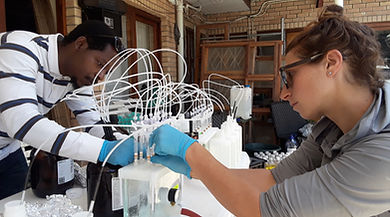Field Work
Besides lab-based experiments and analytical infrastructure, we are engaged in different field studies. Through various collaborations with researchers at other universities and programs we have been fortunate to collected samples from different locations around the planet to study the chemistry that drive microbial communities, hosts, and ecosystems.


Coastal Europe
(European Union)
We are currently taking part in the TREC Expedition (Traversing European Coastlines), organized by EMBL. We sail with S/V Tara and study how xenobiotics at the land-sea interface influence marine microbial communities.



Southern California
(USA/Mexico)
From 2017 till 2020 we conducted several spatio-temporal surveys in the coastal region between San Diego (USA) and Tijuana (Mexico), to study human impacts on coastal environments and how coastal pollution may come back to us.



Port Elizabeth
(South Africa)
In 2018 we spent 4 week in South Africa, visiting the group of Rosie Dorrington at Rhodes University to conduct a spatial survey to map chemical and microbial gradients in Stromatolite pools (rocks made by cyanobacteria) at Schoenmakerskop.



Mo'orea
(French Polynesia)
In 2017 we were fortunate to spend 3 weeks on Mo'orea, a island in French Polynesia, that hosts a long-term ecological research (LTER) site. In the study, led by Craig Nelson, Linda Wegley and Andi Hass, we investigated how coral reefs and their microbiome produce and take up dissolved organic matter.



California Current
(USA/Pacific)
In 2017 we had the opportunity to join a five week research cruise on the R/V Roger Revelle in the California Current Ecosystem (CCE). As part of the CCE LTER program, we studied the chemical and microbial dynamics of an phytoplankton bloom.



Trabzon
(Turkey)
In 2015, we crossed Turkey from the the Ege University in Izmir to Trabzon in the north eastern part to collect vipers. In the study, led by Ayşe Nalbantsoy and Bayram Göçmen, we investigated regional venom variability in the Caucasus Viper.








